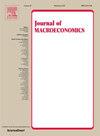老年贫困为何重要:来自收入冲击下消费反应的证据
IF 1.5
3区 经济学
Q3 ECONOMICS
引用次数: 0
摘要
本文研究了消费对特殊收入冲击的反应,重点关注韩国的老年人,韩国是发达国家中老年人贫困率最高的经济体。利用收入和消费动态的半结构模型以及韩国、美国和澳大利亚的家庭调查数据,我们发现韩国老年家庭对永久性收入冲击的消费反应比韩国中年家庭高30%,比美国和澳大利亚老年家庭高57%。这些巨大的消费反应主要是由缺乏足够自我保险的低财富老年人推动的。我们的研究结果强调了贫困在削弱老年人维持消费保险的能力方面的重要作用,贫困在韩国人的整个生命周期中仍然高度持续存在,从而恶化了他们的福利。此外,我们的研究结果强调了政府转移支付在为老年人提供消费保险方面的关键作用。本文章由计算机程序翻译,如有差异,请以英文原文为准。
Why old-age poverty matters: Evidence from consumption responses to income shocks
This paper investigates consumption responses to idiosyncratic income shocks, focusing on the elderly in Korea—an economy with the highest old-age poverty rate among developed nations. Using a semi-structural model of income and consumption dynamics alongside household survey data from Korea, the U.S., and Australia, we find that Korean elderly households exhibit consumption responses to permanent income shocks that are 30% points higher than those of middle-aged households in Korea and 57% points higher than those of elderly households in the U.S. and Australia. These large consumption responses are primarily driven by the low wealth elderly, who lack sufficient self-insurance. Our findings emphasize the significant role of poverty, which remains highly persistent throughout the life cycle in Korea, in undermining the elderly’s ability to maintain consumption insurance, thereby deteriorating their welfare. Furthermore, our results highlight the critical role of government transfers in providing consumption insurance for the elderly.
求助全文
通过发布文献求助,成功后即可免费获取论文全文。
去求助
来源期刊

Journal of Macroeconomics
ECONOMICS-
CiteScore
2.50
自引率
7.10%
发文量
53
审稿时长
76 days
期刊介绍:
Since its inception in 1979, the Journal of Macroeconomics has published theoretical and empirical articles that span the entire range of macroeconomics and monetary economics. More specifically, the editors encourage the submission of high quality papers that are concerned with the theoretical or empirical aspects of the following broadly defined topics: economic growth, economic fluctuations, the effects of monetary and fiscal policy, the political aspects of macroeconomics, exchange rate determination and other elements of open economy macroeconomics, the macroeconomics of income inequality, and macroeconomic forecasting.
 求助内容:
求助内容: 应助结果提醒方式:
应助结果提醒方式:


